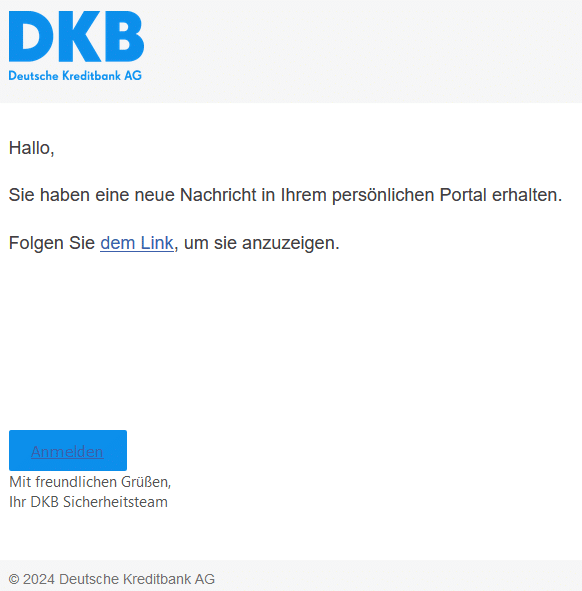Criminals send fake emails in the name of DKB that appear authentic at first glance in order to lure unsuspecting customers into a trap. This tactic poses a serious threat to the security of customers' personal and financial information.
The DKB scam in detail
The scam is clever: customers receive an email that supposedly comes from the DKB. It claims that a new message has arrived in the customer's personal mailbox. To view this, the recipient is asked to follow a link.

However, this link does not lead to the official DKB website, but to a page controlled by criminals. Customers should enter their personal data there.
Dangers of phishing
The scammers' goal is to gain unrestricted access to their victims' bank accounts. Customers who enter their details on the fake site are putting themselves at high risk. The fraudsters can use this data to carry out transactions or carry out other criminal activities.
Protective measures and recommendations
DKB customers should be vigilant and check suspicious emails critically. The bank asks its customers not to click on links in unsolicited emails and not to disclose sensitive information. Suspicious messages should be marked as spam and deleted immediately.
It is also advisable to regularly check the security settings of your own email account.
questions and answers
Question 1: What should DKB customers do if they receive a suspicious email?
Answer 1: Customers should not click on links or provide personal information. Instead, they should mark the email as spam and delete it.
Question 2: How can you tell whether an email actually comes from the DKB?
Answer 2: Real emails from DKB usually contain specific information that is only known to the bank and the customer. They also use the bank’s official domain in the sender address.
Question 3: What can you do to protect yourself from phishing?
Answer 3: Always be vigilant, regularly check your security settings and stay informed about the latest phishing methods and traps .
Conclusion
It is important that customers of DKB and other banks be careful with incoming emails or messages. Phishing attacks are a constant threat and can have serious consequences. Through vigilance, caution and awareness of danger, customers can protect themselves and their assets.
Source: t-online , consumer advice center
Stay informed and safe – subscribe to the Mimikama newsletter and register for our online lectures and workshops .
Also read:
Notes:
1) This content reflects the current state of affairs at the time of publication. The reproduction of individual images, screenshots, embeds or video sequences serves to discuss the topic. 2) Individual contributions were created through the use of machine assistance and were carefully checked by the Mimikama editorial team before publication. ( Reason )

